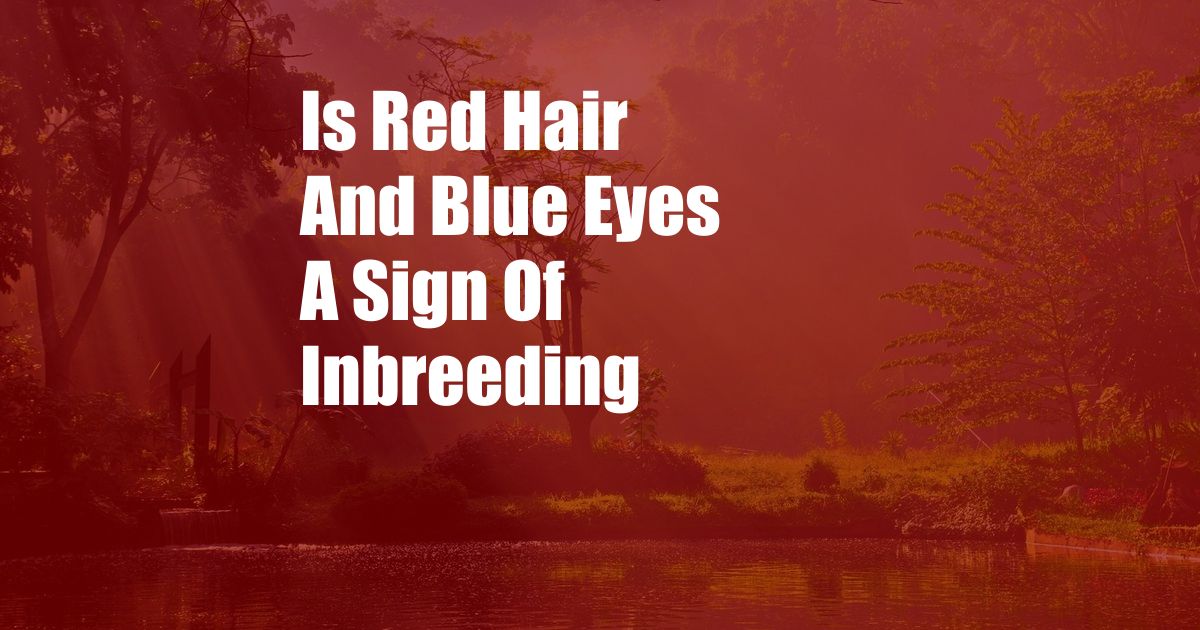
Is Red Hair and Blue Eyes a Sign of Inbreeding?
In the captivating world of human genetics, certain pairings of physical traits often spark curiosity and speculation. One such combination that has long fascinated observers is the co-occurrence of red hair and blue eyes. For centuries, this striking phenotype has been associated with rumors of inbreeding, raising questions about the relationship between these traits and the potential genetic risks they may carry.
Before delving into the science behind this intriguing connection, it’s essential to dispel the myth that red hair and blue eyes are inherently signs of inbreeding. While it’s true that close familial relationships can increase the likelihood of inheriting certain genetic traits, including hair and eye color, genetics alone cannot determine the validity or morality of any relationship.
The Genetics of Red Hair and Blue Eyes
Red hair is a result of a mutation in the MC1R gene, which is responsible for producing the pigment melanin that determines hair, skin, and eye color. This mutation leads to a reduced production of eumelanin, the dark pigment responsible for brown and black hues, allowing pheomelanin, the pigment responsible for red hair, to become more prominent.
Blue eyes, on the other hand, are caused by a different gene called OCA2, which is involved in the production of another type of melanin called melanin. In individuals with blue eyes, the OCA2 gene has a specific mutation that reduces the amount of melanin produced in the eye’s iris, resulting in the characteristic blue color.
The Correlation between Red Hair and Blue Eyes
While red hair and blue eyes are not directly linked genetically, they are often seen together due to a shared evolutionary history. Both traits are more common in populations that have historically lived in northern European regions, where there is less exposure to sunlight and a higher prevalence of lighter skin and hair colors.
Inbreeding and its Potential Effects
Inbreeding, the mating of closely related individuals, can increase the risk of inheriting rare genetic disorders, as it reduces the genetic diversity within a population. However, it’s important to note that not all inbred individuals will develop genetic issues, and the likelihood of these issues depends on the specific genetic mutations involved.
Expert Advice
To gain a comprehensive understanding of the complex relationship between genetics, inbreeding, and physical traits, it’s essential to consult with qualified healthcare professionals, such as geneticists or genetic counselors.
These experts can provide personalized advice based on an individual’s family history, genetic testing results, and any potential health concerns. They can also offer support and guidance for those who may be concerned about the implications of inbreeding or the inheritance of certain genetic traits.
FAQs
- Q: Is red hair and blue eyes a genetic mutation?
A: Yes, both red hair and blue eyes are caused by specific genetic mutations. - Q: Are people with red hair and blue eyes more likely to be inbred?
A: Not necessarily. While inbreeding can increase the likelihood of inheriting these traits, it’s not a definitive factor. - Q: Are there any health risks associated with red hair and blue eyes?
A: In general, no. However, individuals with red hair may be more sensitive to sunlight, and fair-skinned individuals with blue eyes may be more at risk for sun damage.
Conclusion
The co-occurrence of red hair and blue eyes has captivated generations of observers, leading to both fascination and speculation. While genetics play a role in determining these traits, it’s essential to dispel any misconceptions that they inherently indicate a history of inbreeding.
For a more comprehensive understanding of the relationship between genetics and physical traits, consulting with qualified healthcare professionals is strongly recommended. They can provide personalized advice and support based on an individual’s unique circumstances.
Would you like to learn more about the science behind human genetic variations?